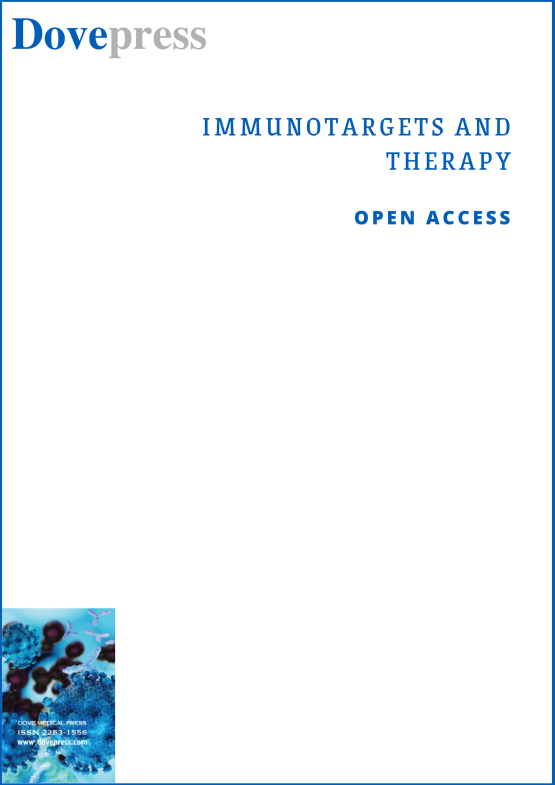Submit a Manuscript to the Journal
ImmunoTargets and Therapy
For an Article Collection on
Oral Vaccines for Infectious and or Non-Infectious Diseases
Manuscript deadline
01 October 2024

Article collection guest advisor(s)
Dr. Angus Nnamdi Oli,
Nnamdi Azikiwe University, Nigeria
Dr. Adekunle Rowaiye,
National Biotechnology Development Agency, Nigeria
Oral Vaccines for Infectious and or Non-Infectious Diseases
Dove Medical Press is pleased to invite you to submit your research to an upcoming Article Collection on "Oral Vaccines for Infectious and or Non-Infectious Diseases" organized by Dr. Angus Nnamdi Oli, and Dr. Adekunle Rowaiye in ImmunoTargets and Therapy.
Vaccines are biological formulations of antigenic material(s) and excipients capable of inducing protection against one or more infectious or malignant diseases of interest. Next to safe drinking water, vaccines have remained the cornerstone of public health interest as they remain the most cost-effective way to prevent infectious and malignant diseases. Vaccines are most commonly administered by needle injections and only a few are administered through the oral or the nasal routes. Oral vaccines are more advantageous than injection-based vaccines for a number of reasons: including increased safety, ease of administration and compliance, and simpler manufacture and delivery. Additionally, the oral route allows for the development of cellular and humoral immune responses at mucosal and systemic locations to provide a more extensive and long-lasting immunity. Convenient for all ages, oral vaccines can offer immunity against varieties of infectious diseases.
Edible vaccines, also referred to as food vaccines, plant-based vaccines, or green vaccines, are a group of newly emerging oral vaccines and may later become possible alternatives to cold-chain vaccines, especially for developing countries. The concept of using edible tissues of genetically engineered crops as a manufacturing and delivery system for biologics was first introduced in the early 1990s by Dr. Charles Arntzen and his associates. This plant-based vaccine can be developed against both communicable and non-communicable diseases and can be taken either by eating the edible part of the transgenic crop or by oral administration of the refined protein extract.
It is essential to invest more research efforts into developing stable oral vaccines as a delivery route. Furthermore, oral vaccines which are grown in antigen-producing plants will eliminate the need for transportation and cold chains, and will overcome the challenges of inaccessibility to vaccines in many rural communities of developing countries. More scientific studies are needed in various aspects of oral vaccine to tackle myriads of human and veterinary diseases.
We welcome papers covering in silico studies relating to any aspects of epitope identification and oral vaccine design: Immunology and immunological aspects of oral vaccines; Animal models of diseases (communicable and non-communicable) being experimented upon with any form of oral vaccine; Oral and edible vaccines; Implementation Science and management; Oral vaccines for animal and human diseases; and other aspects of oral vaccines. Original research, Commentaries, Letters to the Editor, and Reviews are welcome.
Please review the Submission Instructions below prior to submitting a manuscript.
About the Guest Advisors
Dr. Angus Nnamdi Oli, a trained Pharmacist, is a Reader at Nnamdi Azikiwe University, Awka, Nigeria with expertise in Vaccinology, Immunology, Pharmaceutical Microbiology Quality Assurance and Infectious Disease Researches. He is listed among the first 500 scholars in Nigeria by Scopus for the years 2022 and 2023. He has undergone several trainings including Massive Open Online Courses (MOOC) on Implementation Research (IR) with a focus on Infectious Diseases of Poverty (IDP) organised by African Regional Training Centre, University of Ghana School of Public Health and the UNICEF/UNDP/World Bank/WHO Special Programme for Research and Training in Tropical Diseases (TDR).
Dr. Adekunle Rowaiye is a Veterinarian and Pharmaceutical Biotechnologist. His research interest is in the discovery, design, and evaluation of drug candidates which include small molecules, natural products, peptides, and proteins. Dr. Rowaiye has several publications in international journals and he is presently working on the discovery of drug candidates that will retard the aging process and prevent neurodegenerative diseases.
Benefits of publishing open access within Taylor & Francis
Global marketing and publicity, ensuring your research reaches the people you want it to.
Article Collections bring together the latest research on hot topics from influential researchers across the globe.
Rigorous peer review for every open access article.
Rapid online publication allowing you to share your work quickly.
Looking to Publish your Research?
Find out how to publish your research open access with Taylor & Francis Group.
Choose open accessSubmission Instructions
Manuscript Submissions
All manuscripts submitted to this Article Collection will undergo desk assessment and peer-review as part of our standard editorial process. The Guest Advisors for this Collection will not be handling the manuscripts (unless they are an Editorial Board member).
Please review the journal scope and author submission instructions prior to submitting a manuscript.
Please submit your manuscript on our website, quoting the promo code XYTAJ to indicate that your submission is for consideration in this Article Collection. Please also include any discount codes you have received as these will not be applied retrospectively. The deadline for submitting manuscripts is 1st October 2024.
Please contact Ashley Ambros, Commissioning Editor with any queries and discount codes regarding this Article Collection.
All manuscripts submitted to this Article Collection will undergo desk assessment and peer-review as part of our standard editorial process. Guest Advisors for this collection will not be involved in peer-reviewing manuscripts unless they are an existing member of the Editorial Board. Please review the journal Aims and Scope and author submission instructions prior to submitting a manuscript.